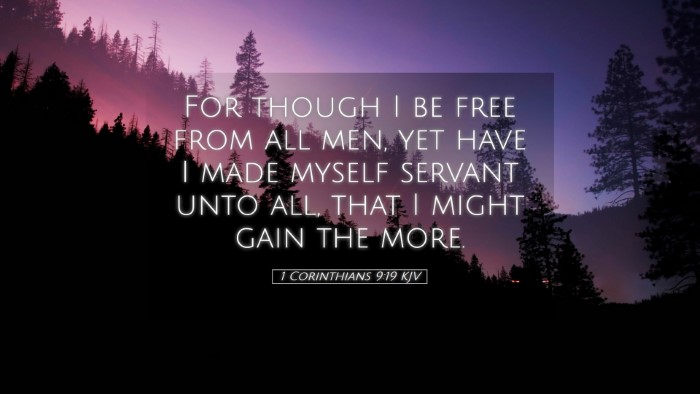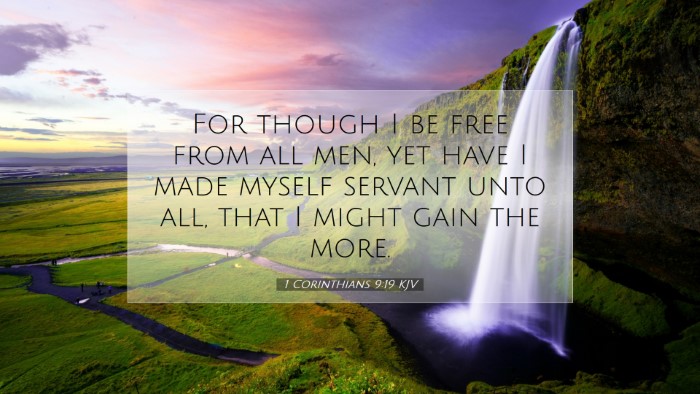Commentary on 1 Corinthians 9:19
Verse Context: In 1 Corinthians 9:19, the Apostle Paul articulates his approach to evangelism and ministry, underscoring his commitment to becoming all things to all people for the sake of the Gospel. This verse is pivotal in understanding Paul's mission strategy and the underlying principle of adaptability in Christian ministry.
Verse Analysis
“For though I be free from all men, yet have I made myself servant unto all, that I might gain the more.”
Insights from Public Domain Commentaries
Matthew Henry's Commentary
Matthew Henry emphasizes the duality of Paul's freedom and servitude. He notes that although Paul is free from the Law and the constraints of human authority, he willingly places himself in a position of service. This serves a greater purpose: to win souls to Christ. Henry posits that this willingness is an illustration of true Christian liberty; it is not a freedom to indulge oneself, but a freedom to serve others. Paul’s approach reflects the heart of the Gospel, which is sacrificial and others-focused.
Albert Barnes' Notes on the Bible
Albert Barnes elaborates on the necessity of flexibility in ministry. He explains that Paul’s strategy was driven by the need to reach a diverse audience with the message of Christ. Barnes highlights that the Apostle did not compromise his core message; rather, he adjusted his methods depending on the cultural background and circumstances of his audience. This approach illustrates a profound understanding of the context in which he ministered, demonstrating a key principle for modern evangelism.
Adam Clarke's Commentary
Adam Clarke offers a thorough examination of what it means to be a servant to all. He notes that Paul's motivation was deeply spiritual and rooted in love—as he longed to bring many to the faith. Clarke discusses how such a mindset informs not just evangelism but the general conduct of Christians in all areas of their lives. He asserts that this level of selflessness should be modeled in the church today, fostering an environment of inclusivity and outreach.
Key Themes
- Christian Freedom: Paul’s declaration of freedom reflects a deeper spiritual truth. True freedom enables believers to serve others without the constraints of selfish ambition.
- Servanthood: The call to servanthood is paramount. Paul demonstrates that effective ministry is rooted in love and selflessness, willing to endure discomfort for the sake of the Gospel.
- Contextualization: The need for contextualization in the proclamation of the Gospel is a vital takeaway. Paul’s adaptability sets a precedent for modern missions and ministry strategies.
- Evangelistic Zeal: The overarching goal of gaining souls is central to Paul’s mission. This requires intentional action and a heart aligned with Christ's mission to seek and save the lost.
Applications for Modern Ministry
Reflecting on Paul's example, modern pastors and theologians can draw several critical applications for contemporary ministry:
- Flexibility in Approach: Churches should be ready to adjust their methodologies in reaching various demographics while holding fast to the unchanging message of the Gospel.
- Building Relationships: Emphasizing the importance of building genuine relationships with people from different backgrounds, fostering an environment where they feel welcome and valued.
- Community Engagement: Encouraging involvement in community issues, reflecting Christ's compassion and service to others, further opening doors for evangelism.
- Training for Servanthood: Pastors should instill a sense of servanthood among congregants, teaching that greatness in the Kingdom of God is achieved through service.
Conclusion
1 Corinthians 9:19 serves as a powerful reminder of the Apostle Paul’s dedication to the Great Commission. His example calls Christians to reflect on their own approaches to evangelism and ministry, urging them to embrace a spirit of servanthood and adaptability. The teachings of Henry, Barnes, and Clarke amplify this message, encouraging deeper reflection on the sacrifices made for the sake of others. Truly, being free in Christ is intricately tied to being a servant to all, striving to advance the Kingdom through love and understanding.


